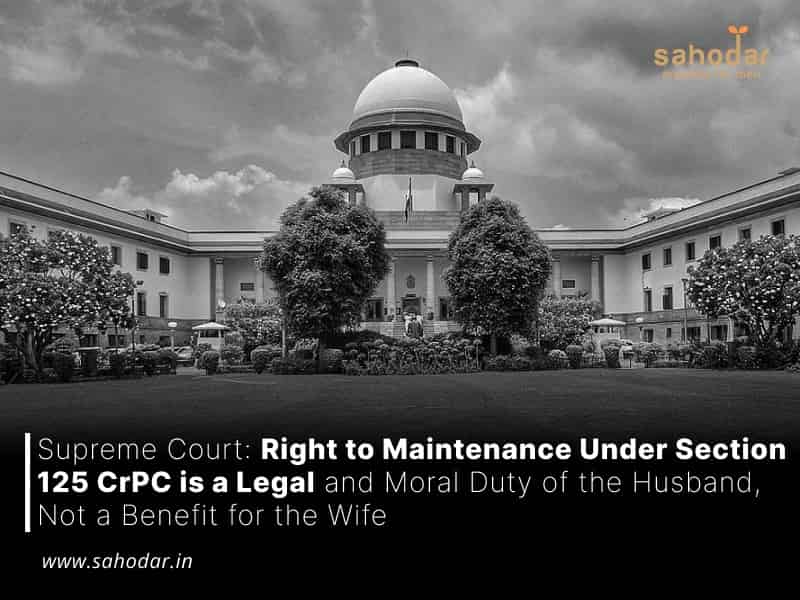The Supreme Court allowed a Criminal Appeal preferred by a wife against the Order of the Telangana High Court.
The Supreme Court underscored that the right to maintenance under Section 125 of the Criminal Procedure Code (CrPC) is not a privilege granted to a wife but a legal and moral obligation of the husband.
This observation was made in a criminal appeal filed by a wife challenging the Telangana High Court’s order.
The two-Judge Bench of Justice B.V. Nagarathna and Justice Satish Chandra Sharma observed, “We are aware that this Court has previously denied maintenance in cases of subsisting marriages (See Yamunabai (supra) and Bakulabai (supra)). However, a plea of separation from the first marriage was not made in those cases and hence, they are factually distinguishable. It must be borne in mind that the right to maintenance u/s. 125 CrPC is not a benefit received by a wife but rather a legal and moral duty owed by the husband.”
Brief Facts
The Appellant married in 1999 and, during the course of the marriage, gave birth to a son in 2000. The couple lived together until disputes arose, and after returning from the United States in 2005, they began living separately. Eventually, they formalized their separation through a Memorandum of Understanding (MoU), dissolving their marriage.
Subsequently, the Appellant became acquainted with her neighbor, the Respondent, and the two got married. The Respondent later filed a petition under Section 12 of the Hindu Marriage Act, 1956, along with Section 7 of the Family Courts Act, 1984, seeking annulment of the marriage. The Family Court granted the petition, declaring their marriage null and void.
In 2006, the Appellant remarried the Respondent, and this second marriage was officially registered, with a certificate issued by the Registrar of Marriage.
The couple welcomed a daughter in 2008. However, disputes arose between them, leading the Appellant to file a complaint against the Respondent and his family under Sections 498A, 406, 506, and 420 of the Indian Penal Code (IPC), along with Sections 3 and 4 of the Dowry Prohibition Act, 1961 (DP Act).
Subsequently, the Appellant filed an application for maintenance under Section 125 CrPC before the Family Court, which awarded ₹3,500 per month to Appellant No. 1 and ₹5,000 per month to Appellant No. 2. Aggrieved by this decision, the Respondent filed a Criminal Revision Petition. The High Court upheld the maintenance granted to the daughter (Appellant No. 2) but set aside the maintenance awarded to Appellant No. 1, ruling that she could not be considered the Respondent’s legal wife as her first marriage had not been legally dissolved through a court decree.
Challenging this decision, the Appellant approached the Supreme Court.
Reasoning
The Supreme Court in view of the above facts, noted, “The short question before us is whether a woman is entitled to claim maintenance u/s. 125 CrPC from her second husband while her first marriage is allegedly legally subsisting. … The present case does not concern a live-in relationship. The Family Court made a factual finding that Appellant No. 1 married the Respondent and that finding is not disputed by the Respondent. Instead, the Respondent seeks to defeat the right to maintenance by claiming that his marriage to Appellant No. 1 is void ab initio as her first marriage is still subsisting.”
The Court observed that the Respondent had knowingly married the Appellant not just once, but twice. The Appellant presented an MoU of separation with her first husband as evidence before the Court. While acknowledging that this document does not constitute a formal divorce decree, the Court noted that it clearly indicates the dissolution of their marital ties, their separate living arrangements, and the fact that the Appellant is not receiving maintenance from her first husband.
“Therefore, barring the absence of a legal decree, Appellant No. 1 is de facto separated from her first husband and is not deriving any rights and entitlements as a consequence of that marriage”, it further said.
The Court held that, considering the social justice objective of maintenance under Section 125 CrPC in light of the specific facts and circumstances of the case, it would be unjust to deny maintenance to the Appellant.
“It is settled law that social welfare provisions must be subjected to an expansive and beneficial construction and this understanding has been extended to maintenance since Ramesh Chander (supra). An alternate interpretation would not only explicitly defeat the purpose of the provision by permitting vagrancy and destitution, but would also give legal sanction to the actions of the Respondent in knowingly entering into a marriage with Appellant No.1, availing its privileges but escaping its consequent duties and obligations”, it also noted.
The Court noted that the only potential concern in adopting a beneficial interpretation would be the possibility of the Appellant claiming dual maintenance; however, that does not apply in the present case.
Consequently, the Supreme Court allowed the appeal and reinstated the maintenance award granted by the Family Court.

